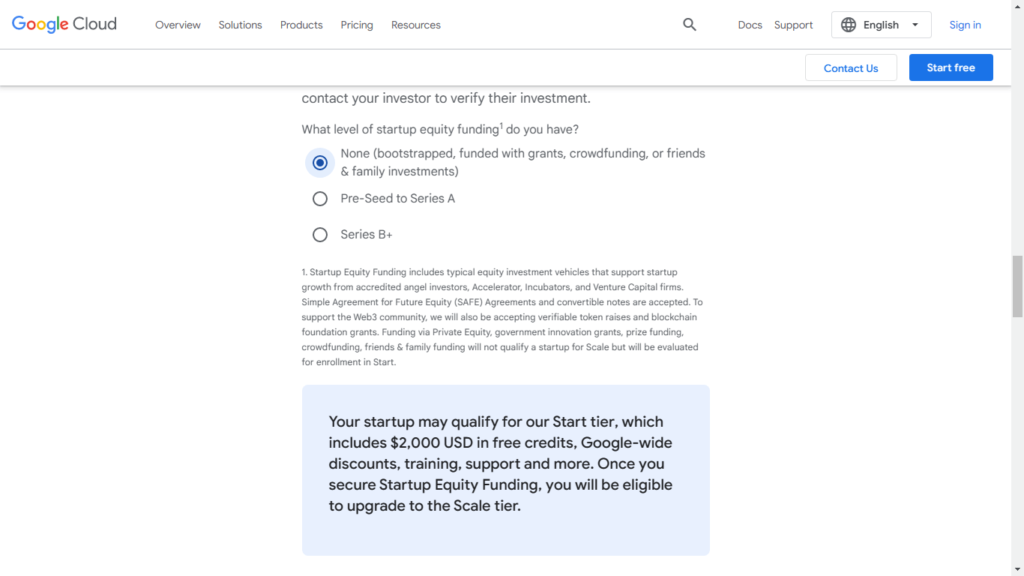Google Cloud Platform for Startups: Empowering Innovation and Scalability

Startups encounter a variety of difficulties in terms of scalability, cost-effectiveness, and seamless operations in today’s fast digital environment. Cloud computing platforms have become crucial resources for entrepreneurs to use in order to overcome these challenges.
The Google Cloud Platform (GCP) stands out among them as a complete solution that offers start-ups the tools, adaptability, and cutting-edge technology required to flourish in a cutthroat market. We will go into the realm of GCP for startups in this article, looking at its features, advantages, and actual examples of how it will help you grow your business.
What is Google Cloud Platform?
Google Cloud Platform (GCP) is a collection of cloud computing services offered by Google. It encompasses a wide range of infrastructure and platform services, including computing power, storage, networking, databases, machine learning, and more. GCP provides a secure and scalable environment for startups to build, deploy, and manage their applications and data.
Key Benefits of GCP for Startups
Scalability and flexibility
One of the key advantages of the Google Cloud Platform for startups is its scalability and flexibility.
GCP provides startups with the ability to rapidly scale their infrastructure as their user base and demands grow. With GCP’s autoscaling capabilities, resources are automatically allocated based on real-time demand, enabling startups to handle traffic spikes without disruptions.
For example, an e-commerce startup can seamlessly accommodate surges in online traffic during holiday seasons or flash sales, ensuring a smooth user experience.
Cost Optimization
Cost optimization is a critical consideration for startups, and GCP offers several features to help startups optimize their expenses. GCP follows a pay-as-you-go model, allowing startups to pay only for the resources they consume. This eliminates the need for upfront infrastructure investments, making it more cost-effective for startups.
Additionally, GCP offers sustained usage discounts, which provide cost benefits for long-running workloads. Startups can also leverage preemptible instances, which are highly affordable, but with the caveat of potential termination on short notice. This is particularly useful for non-critical workloads such as batch processing and development/testing environments.
Robust Infrastructure
GCP’s infrastructure is built on Google’s global network, which boasts high-speed connectivity and low-latency access to data centers worldwide. Startups can leverage this robust infrastructure to deliver reliable and responsive services to their customers.
The global network ensures that users can access the startup’s services quickly, regardless of their geographical location. This level of responsiveness and reliability helps startups build customer trust and enhance their competitive edge in the market.
Advanced Services and Tools
GCP offers a wide range of services and tools that can accelerate the development and deployment of startup applications. Startups can leverage GCP’s managed services like Google Kubernetes Engine (GKE) for container orchestration, Cloud Functions for serverless computing, BigQuery for data analytics, and Cloud AI for machine learning capabilities.
These services enable startups to focus on their core business logic instead of managing the underlying infrastructure.
Integration and Ecosystem
GCP integrates seamlessly with other Google services, such as Google Workspace, Google Analytics, and Google Ads. This integration allows startups to leverage the power of Google’s ecosystem and gain insights from different data sources.
GCP also provides robust APIs and SDKs, making it easier for startups to integrate their applications with external systems and build innovative solutions.
Security and Compliance
Startups need to prioritize security and comply with industry regulations. GCP has built-in security measures, including data encryption, identity and access management, and DDoS protection.
GCP also offers compliance certifications for various standards, such as GDPR, ISO 27001, and HIPAA, ensuring startups meet regulatory requirements and gain customer trust.
Support and Documentation
GCP provides extensive documentation, tutorials, and resources to help startups navigate the platform effectively. Startups can also benefit from Google’s technical support, which offers assistance and guidance in resolving any issues or challenges they may encounter.
With Google for Startups cloud program, you can get up to $500 Google Cloud Skills Boost credits for online courses and hands-on labs. This will enable startups to learn and understand cloud computing at the expense of Google.
Core Services and Features of GCP for Startups
Google Cloud Platform offers a wide range of core services and features that cater to the specific needs of startups. Here are some key services that empower startups on GCP:
Computing Power
GCP provides startups with powerful computing capabilities through services like Compute Engine and Kubernetes Engine.
Compute Engine offers virtual machines with flexible sizing options and customizable configurations, allowing startups to run applications and workloads efficiently.
Kubernetes Engine, on the other hand, simplifies the management and scaling of containerized applications. It provides startups with a reliable and scalable platform for their container deployments.
Storage and Databases
Startups often deal with large volumes of data, and GCP offers a variety of storage and database solutions to meet their needs. Cloud Storage provides a durable and highly available object storage service, allowing startups to store and retrieve data easily.
Cloud SQL offers managed relational databases, ensuring scalability and ease of management for startups’ applications. Additionally, Cloud Firestore is a flexible and scalable NoSQL document database that helps startups build responsive and scalable applications.
Networking and Content Delivery
GCP’s networking and content delivery services enable startups to optimize their application performance and ensure a seamless user experience.
Virtual Private Cloud (VPC) allows startups to create their own private network within GCP, providing a secure and isolated environment for their applications.
Load balancing and content delivery network (CDN) services ensure efficient distribution of traffic and content, improving the performance and availability of startups’ applications across the globe.
Data Analytics and AI
GCP’s data analytics and AI capabilities empower startups to extract valuable insights from their data and build intelligent applications.
BigQuery, a serverless data warehouse, enables startups to analyze large datasets quickly and gain actionable insights.
Cloud Dataflow provides a fully managed service for real-time data processing and batch processing, facilitating real-time analytics and stream processing.
Moreover, Cloud AutoML allows startups to build custom machine learning models without extensive expertise, enabling them to develop AI-powered applications.
Developer Tools and Services
Google Cloud Platform also offers a range of developer tools and services that enhance productivity and streamline the development process for startups.
Cloud build
Cloud Build provides a fully managed continuous integration and delivery platform, enabling startups to automate their software builds and deployments.
Cloud Build is a service that automates the building, testing, and deploying of your code.
It can be used to build and deploy your code to a variety of targets, including Google Cloud Platform, Amazon Web Services, and Kubernetes. Cloud Build is a great way for startups to automate their deployments and save time and money.
Cloud functions
Cloud functions allow startups to run event-driven, serverless functions in response to events, reducing operational complexities.
A cloud function is a small, single-purpose code snippet that runs in Google Cloud. It can be triggered by events, such as HTTP requests, Cloud Pub/Sub messages, or Cloud Storage events. Cloud functions are a great way to offload tasks from your web app or backend, such as:
- Sending emails
- Processing images
- Generating reports
- Backing up data
- Running machine learning models
Cloud functions are also a great way to build serverless applications. Serverless applications are applications that run without the need for a dedicated server. This can save startups money on infrastructure costs.
Cloud source repositories
Cloud Source Repositories provide a secure and scalable version control system for startups’ source code, fostering collaboration and efficient code management.
It is a managed Git service that offers secure, scalable, and highly available storage for your code.
Cloud Source Repositories are also integrated with other Google Cloud Platform services, such as Cloud Build and Cloud Deployment Manager. This makes it easy to automate your development and deployment pipelines, which can save you even more time and money.
Google Cloud Platform for Startups
Google Cloud Platform for Startups is a program that provides startups with access to Google Cloud Platform resources, support, and discounts. The program is designed to help startups accelerate their growth and innovation.
Benefits of Google Cloud Platform for Startups
The benefits of the Google Cloud Platform for Startups include:
- Access to Google Cloud Platform resources: Startups in the program receive credits that can be used to purchase Google Cloud Platform services. These credits can be used to cover the cost of infrastructure, machine learning, data analytics, and other services.
- Technical support: Startups in the program have access to technical support from Google Cloud experts. This support can help startups troubleshoot problems, optimize their deployments, and learn how to use Google Cloud Platform services.
- Business support: Startups in the program have access to business support from Google experts. This support can help startups with marketing, sales, and fundraising.
- Discounts: Startups in the program receive discounts on Google Cloud Platform services. These discounts can save startups money on their cloud computing costs.
How to Apply for Google Cloud Platform for Startups
To apply for Google Cloud Platform for Startups, startups must meet the following eligibility requirements:
- The startup must be a for-profit company that is less than 10 years old.
- The startup must be headquartered in a country that is eligible for the program.
- The startup must have raised less than $10 million in funding.
Once a startup has met the eligibility requirements, it can apply for the program online. The application process is quick and easy.
How it works
Google Cloud Platform for Startups works by providing startups with credits that can be used to purchase Google Cloud Platform services. These credits are typically worth up to $200,000 over two years.
Startups can use these credits to cover the cost of infrastructure, machine learning, data analytics, and other services.
In addition to credits, Google Cloud Platform for Startups also provides startups with access to technical support and business support.
Technical support is available from Google Cloud experts who can help startups troubleshoot problems, optimize their deployments, and learn how to use Google Cloud Platform services.
Business support is available from Google experts who can help startups with marketing, sales, and fundraising.
How to apply
To apply for Google Cloud Platform for Startups, startups must meet the eligibility requirements. If you met the requirements, follow this process:
- Visit the GCP for startups website @ https://cloud.google.com/startup

- On the page that appears, scroll down and view the two tiers: start tier and scale tier.

- Click the Apply button on the tier you are eligible for, to start the application.

- Fill out the form that shows up, and click on the Submit my application button when done.
- Before you proceed with the registration, you should have the following:
- A legal or registered name for your business
- Google Cloud Billing Account ID
- A domain name. if you wish to get a domain name, you can contact us now.
- A functional business email address
We can help you with the general onboarding process such as registering your business and obtaining your GCBA ID, your domain name, and your business email. If you are interested, contact us now!
Real-World Examples of Startups Leveraging GCP
Let’s explore how some startups have leveraged the Google Cloud Platform to drive innovation, scale their operations, and achieve success:
SnapTravel
SnapTravel is an AI-powered hotel booking platform that leverages GCP’s machine-learning capabilities to deliver personalized hotel recommendations.
Using GCP’s Cloud Machine Learning Engine and BigQuery, SnapTravel analyzes vast amounts of user data, such as past bookings, preferences, and search history. This data is processed to provide tailored hotel suggestions to users, considering their unique preferences and requirements.
By personalizing the recommendations, SnapTravel enhances customer satisfaction and increases conversion rates, ultimately driving the growth of its platform.
Coinbase
Coinbase, a leading cryptocurrency exchange, relies on GCP’s robust infrastructure and autoscaling features to handle a massive volume of transactions. GCP’s global load balancers efficiently distribute incoming traffic, ensuring a seamless experience for Coinbase users, even during periods of high market activity.
Additionally, GCP’s managed instance groups automatically scale resources based on demand, dynamically allocating computing power to handle fluctuating transaction volumes. These features enable Coinbase to maintain high availability, scalability, and reliability as a cryptocurrency trading platform.
Robinhood
Robinhood, a popular investment app, leverages GCP’s data analytics capabilities to monitor and analyze millions of market events in real time. By utilizing BigQuery and Pub/Sub, Robinhood can process vast amounts of financial data quickly, enabling timely investment decisions.
The ability to analyze and respond to market trends in real-time sets Robinhood apart, providing users with up-to-date market insights and empowering them to make informed investment choices.
Supporting the Startup Ecosystem of GCP
Google Cloud Platform actively supports startups through various initiatives:
GCP for Startups program
Google Cloud for Startups program offers eligible startups access to GCP credits, technical support, and training resources. This program helps startups kickstart their journey on the platform, providing them with essential resources and support to accelerate their growth.
Startup launchpad program
The Startup Launchpad program assists startups in building, scaling, and monetizing their products. It offers mentorship, workshops, and networking opportunities, nurturing startup growth and success.
GCP community
GCP fosters a vibrant community through developer meetups, hackathons, and conferences. These events provide startups with valuable networking opportunities, allowing them to collaborate, learn from industry experts, and share experiences with their peers.
Conclusion
Google Cloud Platform has become a go-to solution for startups, providing them with the scalability, cost optimization, and robust infrastructure required to succeed in today’s competitive landscape.
With its extensive range of services, startups can focus on innovation and core business objectives, while GCP handles the technical complexities. Real-world examples demonstrate how startups have harnessed the power of GCP to deliver exceptional products and services.
Furthermore, GCP’s supportive startup ecosystem ensures that startups receive the necessary resources and guidance to thrive. As more startups embrace GCP, the platform continues to unlock new possibilities and drive the success of ambitious ventures worldwide.
It is now your turn to tryout GCP for startups. If you are ready, we are here to help you. Just contact us immediately.
Meanwhile, before I leave you, take a minute to tell me what you think concerning GCP for Startups program and your readiness to join. Use the comment box below.











